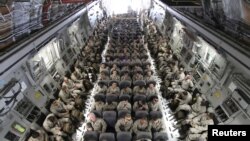The State Department’s top official for Central Asia arrives in the region Tuesday to reassure leaders that Washington remains committed to the development and defense of Central Asia.
The three-day trip by Robert O. Blake Jr., Assistant Secretary of State for South and Central Asia, comes immediately after the visit to Washington of Afghan President Hamid Karzai. During that visit, President Barack Obama announced that American soldiers will soon play only a supporting role in defending Afghanistan from Taliban rebels. By the end of next year, most American soldiers are to leave Afghanistan.
"While we may be reducing our military presence after 2014, we will remain very much engaged economically to ensure the continued security and stability of Afghanistan and the region,” Blake told VOA in Washington before leaving for Central Asia. “Obviously, we have invested a lot of blood and treasure over the past 10 years. We have a very important investment to protect.”
Blake meets with leaders in Turkmenistan on Tuesday, then flies to Kyrgyzstan where the United States maintains the Manas air-transit center at the international airport of Bishkek, the capital.
Blake said he would discuss extending the base lease, which expires next year.
“Manas is a very important logistics operation for the United States, but also the center through which almost all our troops pass to go into Afghanistan,” he said.
About 10 minutes by helicopter from Manas, Russia maintains its own air base in Kant, Kyrgyzstan, where, last year, Moscow extended its lease for 15 years.
Last October, Russian President Vladimir Putin flew to Tajikistan, just north of Afghanistan, where Russia gained 30-year extensions on three base leases. Housing a total of 6,000 troops, the trio of bases represent Russia’s largest foreign troop deployment.
While Russia restores historic military ties with Central Asia, China's focus is economic. New pipelines now carry Central Asian oil and gas east to China while new roads carry Chinese goods west to Central Asia.
Looking ahead, Blake says there will be roles in Central Asia for China, Russia and the United States.
“Far from being a 'Great Game' in Afghanistan and in Central Asia, there is more of a great gain,” he said. “There is space for all of us to benefit, and there is space for all of us to have a role.”
After working with the region for almost four years, Blake draws this conclusion: “All the Central Asians want to see the United States play a greater role. They welcome having the United States very involved in promoting trade, in promoting stability.”
As the numbers of American troops decline in Afghanistan, Washington wants to reassure regional leaders that the United States will remain engaged in Central Asia.
The three-day trip by Robert O. Blake Jr., Assistant Secretary of State for South and Central Asia, comes immediately after the visit to Washington of Afghan President Hamid Karzai. During that visit, President Barack Obama announced that American soldiers will soon play only a supporting role in defending Afghanistan from Taliban rebels. By the end of next year, most American soldiers are to leave Afghanistan.
"While we may be reducing our military presence after 2014, we will remain very much engaged economically to ensure the continued security and stability of Afghanistan and the region,” Blake told VOA in Washington before leaving for Central Asia. “Obviously, we have invested a lot of blood and treasure over the past 10 years. We have a very important investment to protect.”
Blake meets with leaders in Turkmenistan on Tuesday, then flies to Kyrgyzstan where the United States maintains the Manas air-transit center at the international airport of Bishkek, the capital.
Blake said he would discuss extending the base lease, which expires next year.
“Manas is a very important logistics operation for the United States, but also the center through which almost all our troops pass to go into Afghanistan,” he said.
About 10 minutes by helicopter from Manas, Russia maintains its own air base in Kant, Kyrgyzstan, where, last year, Moscow extended its lease for 15 years.
Last October, Russian President Vladimir Putin flew to Tajikistan, just north of Afghanistan, where Russia gained 30-year extensions on three base leases. Housing a total of 6,000 troops, the trio of bases represent Russia’s largest foreign troop deployment.
While Russia restores historic military ties with Central Asia, China's focus is economic. New pipelines now carry Central Asian oil and gas east to China while new roads carry Chinese goods west to Central Asia.
Looking ahead, Blake says there will be roles in Central Asia for China, Russia and the United States.
“Far from being a 'Great Game' in Afghanistan and in Central Asia, there is more of a great gain,” he said. “There is space for all of us to benefit, and there is space for all of us to have a role.”
After working with the region for almost four years, Blake draws this conclusion: “All the Central Asians want to see the United States play a greater role. They welcome having the United States very involved in promoting trade, in promoting stability.”
As the numbers of American troops decline in Afghanistan, Washington wants to reassure regional leaders that the United States will remain engaged in Central Asia.




